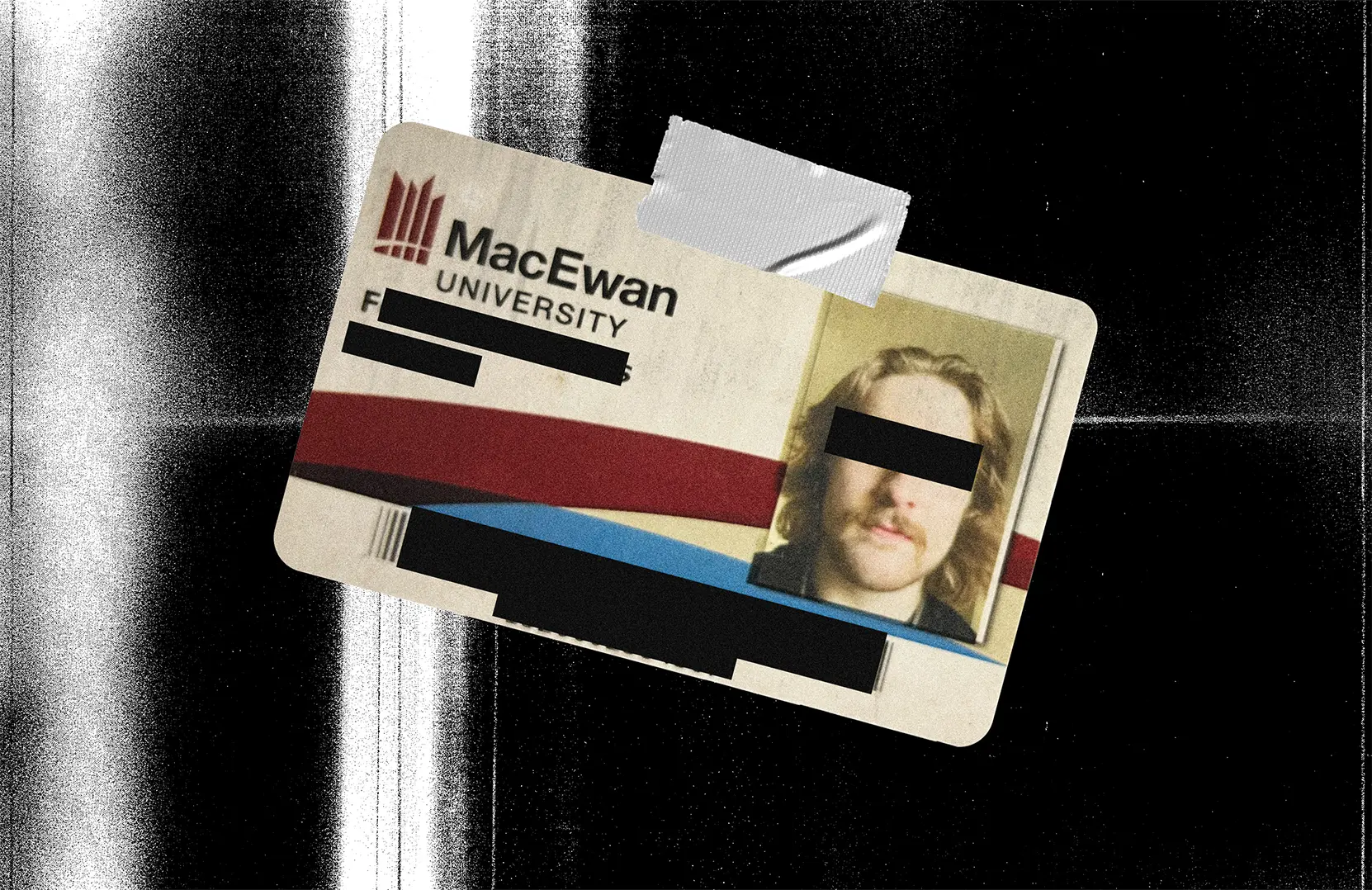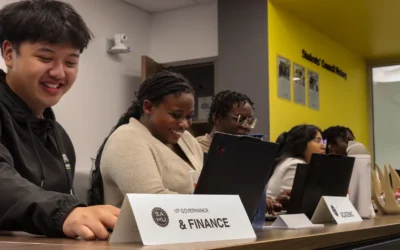The new MacEwan digital ID was unveiled at the beginning of the fall semester. Yet some question whether students were meaningfully consulted.
Emery Davies has been a MacEwan student for several years and has seen firsthand the changes at MacEwan. Over the summer, Davies logged into their student system and was surprised by a major update: MacEwan announced a transition to digital student IDs. The news confused Davies, and they wondered, “How is this more convenient?”
At the beginning of September, MacEwan posted a step-by-step guide for students to sign up for the digital ID. Students were asked to download an app from Transact Campus, a U.S. based company, and upload a selfie and their government ID for verification purposes.
Davies felt an obligation to comment on the post. “What should students do if their phone dies when they need their ID, or if they are among the few students in 2025 who don’t own a smartphone?” they asked.
“Thanks for sharing your thoughts! To reassure you — your physical MacEwan ID card will still work everywhere on campus, and students without a compatible phone or device can continue using it,” MacEwan replied.
“I would’ve liked to see some community outreach engagement before this was implemented,” Davies responded. MacEwan did not reply afterwards.
Davies says MacEwan’s response has been unclear. If students can still use physical IDs, then there is no purpose for introducing digital IDs.
“They’re not making an effective case for why the digital ID is any better than the physical ID that we already have.”
MacEwan’s shift to digital IDs was supposed to update a system that was at the end of its life. But the rollout has left students unsure about how the new ID affects them, and why it was necessary in the first place. It also raises questions about how much meaningful student consultation occurred beforehand and whether MacEwan’s approach reflects a growing disconnect between students and administration.
The Griff reached out to MacEwan with questions about the digital ID. David Almond, associate vice-president (information systems) and chief information officer at MacEwan, responded. He writes, “A digital option, with allowance for physical cards, was a logical next step with the ongoing evolution of technology.”
However, Almond did not explain when the physical ID system will reach its end-of-life, nor did he explain why there was an “urgent need” for the new digital approach.
Almond was also asked about the student consultation process.
According to Almond, SAMU was consulted and even participated in a pilot program — both digital and physical — prior to the broader rollout to students.
“They’re not making an effective case for why the digital ID is any better than the physical ID that we already have”
— Emery Davies, MacEwan student
“I’m also curious what that consultation rollout looked like,” says ex-vice-president (academic) for SAMU and MacEwan student Darcy Hoogers.
“Because, from my own experience as [SAMU] vice-president academic for the 2024 – 2025 school year, we did not engage in or weren’t offered a formal consultation process for this digital ID,” he adds.
“And I just want to be specific here: there were discussions about the digital ID, but never in the form that ‘this is what we want to consult students on’ and ‘this is how student consultation will affect or impact the direction—whether we go with a digital ID, whether we don’t go.’”
Hoogers says that during his time as SAMU vice president (academic), MacEwan did not ask SAMU about the logistics of the digital ID for the broader student population, such as the ways to help new students activate their new IDs, and engage returning students who are used to physical IDs.
“So while there were conversations mostly informal, as for a formal consultation process, one that looks at meaningfully engaging with students and trying to grasp the student opinion or the student perspective on digital IDs,” Hoogers says.
“That did not happen.”
During his term as vice-president (academic), Hoogers says he first heard about the digital ID during a networking event after SAMU and MacEwan broke ground for the new business building last year. He says the MacEwan administrators framed the new ID as something cool, but not as if the decision was already made.
The first time Hoogers learned MacEwan was seriously considering the switch was during a technology fee committee meeting.
Meeting minutes for the committee are not publicly available.
However, the digital ID is mentioned in a library council meeting on Aug. 29, 2024. During the meeting, Eva Revitt, interim dean of the library, mentioned the digital ID card was “moving forward in the winter term,” and physical IDs would eventually be phased out.
The digital ID was only mentioned two more times at library council meetings.
““And I just want to be specific here: there were discussions about the digital ID, but never in the form that ‘this is what we want to consult students on’ and ‘this is how student consultation will affect or impact the direction—whether we go with a digital ID, whether we don’t go.’”
— Darcy Hoogers, MacEwan student & vice president (academic) 2024-2025
Hoogers attended the meetings, but because the announcement was classified as “information,” there was no consultation involved.
While Hoogers’ term ended last April, SAMU president Nathan Poon confirms that the current executive council wasn’t involved in MacEwan’s supposed consultation process either.
“We can definitively say that our current executive committee was not consulted on the MacEwan ID. Our VP academic sits on the library council, and was informed about the MacEwan ID during its implementation process, but this iteration of SAMU executives have not been consulted on the matter directly,” Poon wrote in an email to The Griff.
Poon also notes that MacEwan presented a formal proposal to the technology fee committee, which includes SAMU executives and MacEwan staff, to request that the technology fee be used to cover the subscription and costs associated with the card.
“This proposal was not a consultation with SAMU, but rather a funding request submitted to the committee,” Poon writes.
The committee denied the funding request, and SAMU was neither involved in nor informed about how MacEwan funded the program.
“Following this decision, SAMU was not involved in or informed of how MacEwan proceeded with funding the program.”
According to Almond, the university’s information head, the project steering committee approved the transition to the digital ID. The committee included several individuals of MacEwan’s leadership team, including MacEwan’s provost, Craig Monk. No students were on the committee.
As Davies remains a student at MacEwan, they hope MacEwan is more transparent with its rationale for switching to the digital ID.
“What benefits do they expect to see from it?” Davies asks. “Because the way that I see it, they haven’t told us why. They’ve just said, this is what we’re doing, get with it, or be left behind.”
In his email response, Almond clarified that students are encouraged to sign up for the digital ID, but can still use their physical IDs. Almond also mentioned that new students who don’t have compatible smartphones can request physical ID cards from the technology and services desk on the second floor of building seven.
Davies says they have not yet signed up for the digital ID and will continue to use their physical card until MacEwan stops them.
But the whole ordeal made Davies consider what MacEwan was like years ago.
“One of the things that really drew me to MacEwan was the sense that they’re very oriented towards maintaining a good, strong student community and a lot of student support,” Davies says.
“And what I’ve been seeing in the last few years seems to be a trend of moving away from that original model of supporting students and being engaged with the community to honestly, almost just trying to mimic the [University of Alberta] it feels like.”
The Griff reached out to MacEwan with more questions. MacEwan acknowledged the questions but has yet to respond. This is a developing story.





0 Comments